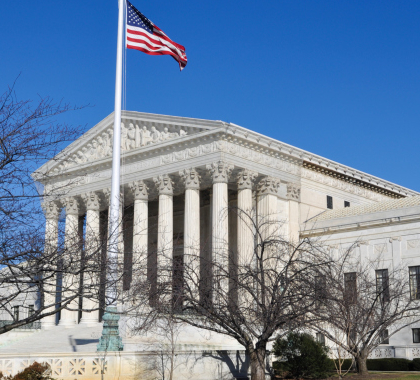A challenge to class action lawsuit settlements that benefit lawyers and leave the class members with trifling awards or nothing at all has been sent to a district court by the U.S. Supreme Court.
The Ninth Circuit Court of Appeals remanded the case, Frank v. Gaos, to the Northern District of California to address plaintiffs’ standing to sue in federal court on May 13. The U.S. Supreme Court sent the case back to the Ninth Circuit to consider the standing issue in a March 20 order.
“We look forward to the standing issue being resolved so that the Court may reach the merits of our appeal,” said Melissa Holyoak, a petitioner in the case, and president and general counsel of the Hamilton Lincoln Law Institute, a nonprofit public interest law firm.
Injured Parties Got Nothing
The original class action suit, Gaos v. Google, sought a settlement of trillions of dollars for 100 million class members for alleged privacy violations committed by Google against users of its search engine.
The plaintiffs’ lawyers negotiated a settlement with Google in which class members received nothing, and lawyers and third parties received $8.5 million.
Frank v. Gaos, a case initiated by Theodore H. Frank, formerly director of litigation at the Competitive Enterprise Institute (CEI), challenged the settlement of the class action suit and the underlying legal doctrine of cy pres, a term shortened from the French phrase meaning “as near as possible.”
When it would be difficult to identify or compensate individual members of the class harmed, cy pres lets attorneys substitute other recipients, such as charities, to receive the settlement funds instead of the class members.
Lawyers Control ‘Slush Fund’
Google made some donations and paid the lawyers representing the class of search engine users claiming harm, explained Frank, who argued his own case before the Supreme Court on October 31 2018, in a CEI news release.
“Plaintiffs’ attorneys negotiated a settlement that paid themselves millions of dollars and gave themselves control of a slush fund to donate to their pet causes, while leaving class members—their clients—with nothing,” stated Frank.
The Gaos settlement is a textbook example of cy pres abuse, stated CEI.
“The cy pres recipients included class counsel’s alma maters and several organizations that Google already supports through donations,” wrote CEI. “This means Google was able to get rid of a lawsuit brought by more than 100 million people by making no material changes to its practices and simply donating to some of the same groups it supports anyway. This unfair settlement typifies cy pres abuse.”
‘Violations Are Sufficiently Concrete’
After the issue of Frank’s and the other plaintiffs’ standing to sue in federal court is resolved, Frank v. Gaos could be judged on its merits, says Holyoak.
“The standing question relates to whether plaintiffs have standing to bring their claims,” said Holyoak. “Specifically, the issue is whether plaintiffs’ allegations of Electronic Communications Privacy Act violations are sufficiently concrete, meaning they are more than just bare procedural violations.
“We are confident that the district court will find standing here because plaintiffs’ alleged injuries—that Google disseminated their private internet search queries—is similar to privacy injuries that the law has recognized for centuries,” said Holyoak.
Jeff Reynolds ([email protected]) writes from Portland, Oregon.





